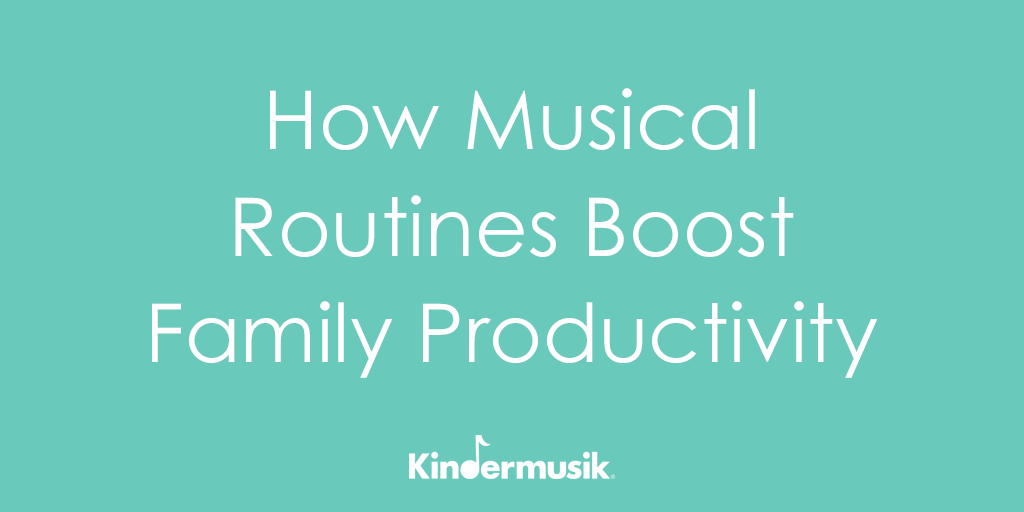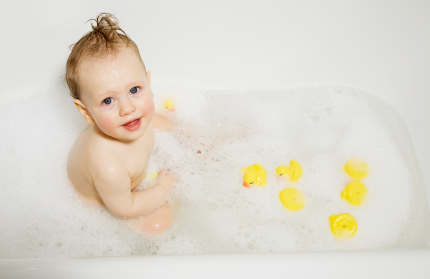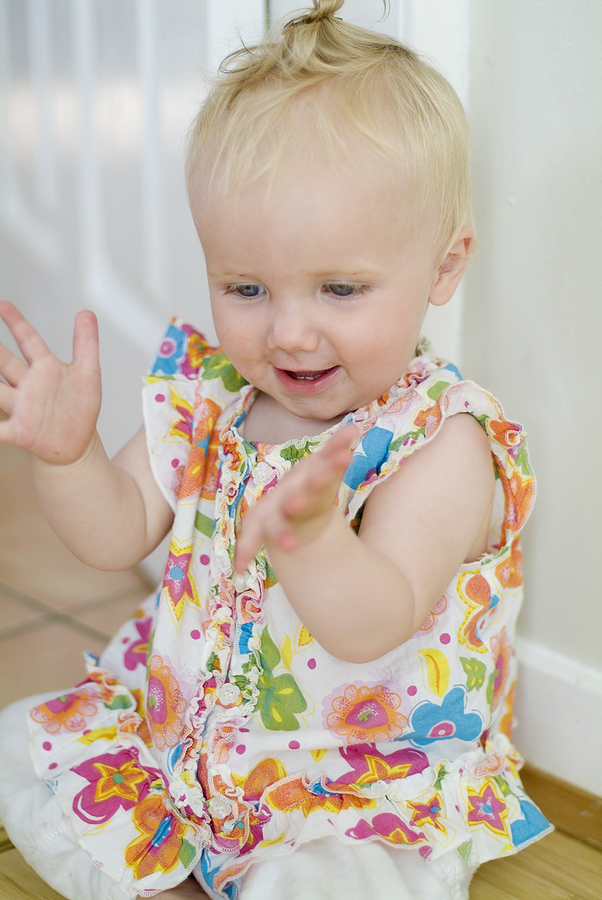Change—especially for children in any capacity—is hard, but one thing always helps…music! Here are 3 quick tips on how music rituals can help alleviate transitions (like drop-off times and hand washing) and enhance child and family engagement.
Continue reading “3 Music Rituals to Help Alleviate Back-to-School Change”How Musical Routines Boost Family Productivity
Here are some quick tips to help families get into a productive, positive daily groove without screens.
Routines bring motivation, productivity, comfort, and even relaxation. Musical routines is the ultimate secret to helping jumpstart and secure healthy morning and evening success. Here’s why…
Continue reading “How Musical Routines Boost Family Productivity”
FOL Fridays: Routines and Rituals
 While routines provide continuity, comfort and security for children, rituals provide children with the opportunity to build connections with others. In a sense, rituals are routines with “extra sparkle.” Families often have rituals associated with holidays and birthdays. According to Becky Bailey, author of I Love You Rituals, “loving, healthy rituals foster the development of loving, emotionally healthy children.” From infancy on, children count on rituals and routines for comfort and security. Routines comfort children and serve as cues for what is expected of them, giving children a sense of control over their environment. When a child knows what will happen next and what is expected of him, he will be better able to participate and to act independently, which is an important developmental step (Poole 1998).
While routines provide continuity, comfort and security for children, rituals provide children with the opportunity to build connections with others. In a sense, rituals are routines with “extra sparkle.” Families often have rituals associated with holidays and birthdays. According to Becky Bailey, author of I Love You Rituals, “loving, healthy rituals foster the development of loving, emotionally healthy children.” From infancy on, children count on rituals and routines for comfort and security. Routines comfort children and serve as cues for what is expected of them, giving children a sense of control over their environment. When a child knows what will happen next and what is expected of him, he will be better able to participate and to act independently, which is an important developmental step (Poole 1998).
IDEA: Plan for simple, fun ways to add the sparkle to your everyday routines that will turn them into special rituals. A “wake up” poem in the morning, a posted schedule for the day, a special placemat at lunch, letting everyone tell about one favorite part of their day around the supper table, a family dance, and a lullaby sung before bedtime at night – any of these are the kinds of little things that can add joy and predictability to your child’s day.
– Compiled by Theresa Case, M.Ed. Theresa’s Kindermusik program at Piano Central Studios in Greenville, SC, is proudly among the top 1% of Kindermusik programs worldwide.
Splish, splish, SPLASH!
The following post was shared from Kindermusik educator Joy Granade. 
Some days bathtime feels like a chore, just one more part of the day you have to slog through to get the kids into bed, so you can crash. However, over the years it’s been amazing to watch the way my hubby has turned bathtime into a special ritual with the boys.
When my oldest was first born, my hubby proudly declared that he wanted the responsibility for bathtime. At first I wasn’t quite so sure as his early attempts were filled with some crazy misadventures. But before long I saw what a treasure bathtime was quickly becoming for my two (and now three) guys.
Proud Kindermusik mama that I am, I have seen in action how important rituals and routines are for helping babies, toddlers, preschoolers (and even grownups) find order and peace in their days. Not only have I seen them ease tantrums and tears, but I’ve also watched how they help us as a family calm and connect to one another. So, here are a few lessons I’ve learned from watching my sweet hubby at bathtime with the boys:
Give yourself time. When you don’t feel rushed, you both can be really present in the moment, which helps you make bathtime a bonding experience but also helps your little one feel relaxed and ready for bed.
Bathtime can be playtime. And of course for little people, playtime is always learning time. Whether you just grab a small colander, funnel, and measuring cups from the kitchen or you buy bathtoys, water play is a blast and a great way to learn. Watch how things sink or float. Talk about colors. Count. Play with textures – washcloths or even sponges cut into shapes or animals. Identify letters (foam ones are fun to stick on the wall).
We even used bathtime to teach a lot of sign language (DUCK, WATER, BATH, IN, OUT, MORE). Our favorite toys: ducks, stacking cups with holes that water can drip through, and now dinosaurs we can bathe. I’ve also heard of families bringing baby dolls or cars to share in the bath as well.
Consider using your hands. Touch is one of the most important ways we connect. A long time ago my hubby declared that he didn’t want to use baby washcloths much, though they are sometimes necessary. He knew that the special act of washing our boys with his bare hands communicated love and affection in a way that a washcloth couldn’t.
Add a little massage. With our littlest babies in the Village classes, we often share a time of baby massage. Bathtime is the perfect time to extend this activity. Whether you just give a little extra squeeze as you scrub your little one down, or you pull out some lotion for a sweet massage after you’ve toweled off, this kind of loving, intentional touch aids in digestion, relieves colic, promotes health, and might even help your child sleep.
Even after we quit giving massages at bathtime, I continued to give backrubs and leg and arm massage as we snuggled before bed when I knew our kids were having a hard time settling down for bedtime.
And of course…make music! Because transitions have always needed a little extra creativity in our household, we made up a bathtime song years ago. (It sounds like the old Batman TV show theme but uses the word Bathtime instead of Batman. Only my hubby.) But it grew from there. Before long we had songs we sang to calm crying babies as we toweled them off, chants for counting “piggies” in the bath (“This little piggy…”), and even songs about scrubbing in the tub. Sometimes we just sang our latest favorite Kindermusik songs or even made up new silly songs. It never matters what we sing, it always makes bathtime easier – especially when it’s been a long day.
Time to get out of the tub! And last but not least, all good things must come to an end, and with bathtime, sometimes the fun is so great that getting out is hard. That’s why it’s a good idea to come up with a few rituals for getting out.
Over the years ours have evolved. For our babies, we sang lullabies to help ease the transition. Then as the boys grew, they counted down 5 minutes, 3 minutes, 1 minute till time to get out of the bath. Soon they were making choices about how to get out of the tub – stomp like a dinosaur out of the bath or jump like a monkey.
But the best was what happened on the other side of the tub wall. Whether they hid under the towel, played peekaboo, or pretended to be butterflies wrapped in a towel cocoon, there was always a big snuggle at the end of bath – my favorite part!
Special thanks to Kindermusik educator Joy Granade for sharing this post from her blog, Kindermusik with Joy. Information about Joy’s Kindermusik program in Kansas City, MO, can be found at her blog.
Again, again!!
 Again, again!! There’s a reason why those are two of your child’s favorite words – repetition is the way your child learns best. Repetition also provides children with a sense of security and predictability, setting the stage for optimal learning. Kindermusik takes full advantage of a learning environment that capitalizes on the comfort of repetition, both in class and at home – especially through the Home Materials.
Again, again!! There’s a reason why those are two of your child’s favorite words – repetition is the way your child learns best. Repetition also provides children with a sense of security and predictability, setting the stage for optimal learning. Kindermusik takes full advantage of a learning environment that capitalizes on the comfort of repetition, both in class and at home – especially through the Home Materials.
Childhood is all about learning. And while it’s tempting to indulge in all the latest learning trends, videos, or technology, for a child, the single best learning tool is repetition. Each time a child is exposed to a new object or experience, new neural connections are made in his brain. Through repetition, these connections are strengthened. Add a little twist to the repetition, like when we add a new verse to a song or a new prop in class, and these neural pathways strengthen and become super-highways of learning.
Repetition is not only good for your child’s brain; it’s highly beneficial for your child’s overall development. Repetition helps your child learn and remember new information, thus giving her a boost of joyful self-confidence because she can predict what comes next. Then there’s also the immense satisfaction of mastering something. Repetition is the way that your child reminds himself of a newfound skill, and the way he experiences a great deal of pleasure through a sense of completion and mastery. Parents can use this love of repetition to their advantage by establishing predictable routines and rituals in the morning or evening, thus helping their child feel secure and in control – something that’s very important to a small child!
Each Kindermusik curriculum from Village to Young Child is deliberately designed to repeat certain activities, in part because of this important connection between repetition and learning, but also because repetition of activities promotes bonding and nurtures a sense of community and belonging. With the Kindermusik experience, ritual and repetition are key components of a predictable and nurturing environment in which learning, bonding, and a love for music naturally and beautifully unfold.
Benefits of repetition in a nutshell:
- >Repetition fuels your child’s memory, confidence, and motor skills.
- >Repetition expands your child’s understanding of the world around him.
- >Repetition contributes to your child’s intellectual development by reinforcing her understanding of the way the world works.
- >Repetition spurs motor development.
- >Repetition helps your child feel good about himself because it reminds him of what he can do.
- >Repetition builds a sense of trust, helping a child develop healthy relationships with others.
- >Repetition is one way your child can exert some control over his environment, which is extremely gratifying for someone with such limited control over her world.
Posted by Theresa Case, whose Kindermusik program at Piano Central Studios is proudly among the top 1% of programs worldwide.





